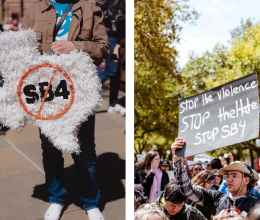
WASHINGTON — A federal court has blocked the arbitrary detention of asylum seekers fleeing persecution, torture, or death in their countries of origin. It also ordered a case-by-case review of whether each asylum seeker in the class-action lawsuit should be released on humanitarian parole. The ruling stems from a challenge brought by the American Civil Liberties Union, Center for Gender and Refugee Studies, Human Rights First, and Covington & Burling LLP.
Government policy stipulates that asylum seekers be granted humanitarian parole as they await their immigration proceedings, provided they meet a series of stringent requirements. Instead, the Trump administration has categorically jailed them indefinitely, in violation of the Constitution, U.S. immigration laws, and the Department of Homeland Security’s own written policy.
“Indefinitely detaining asylum seekers goes against the Constitution and our values as a nation,” said Edgar Saldivar, senior staff attorney for the ACLU of Texas. “The ruling represents a victory against the Trump administration’s efforts to arbitrarily detain families and individuals who only seek safety on our shores. We will continue to resist these inhumane practices.”
“This ruling means the Trump administration cannot use indefinite detention as a weapon to punish and deter asylum seekers,” said Michael Tan, senior staff attorney with the ACLU’s Immigrants’ Rights Project.
The lawsuit targets five U.S. Immigration and Customs Enforcement field offices that have almost entirely stopped granting parole since early 2017. Those offices are Detroit (which covers Michigan and Ohio), El Paso (which covers New Mexico and West Texas), Los Angeles, Newark (which covers New Jersey), and Philadelphia (which covers Pennsylvania).
All the plaintiffs passed credible fear screenings — meaning a U.S. asylum officer has determined their fear of persecution is credible, and that they have a significant possibility of receiving full asylum. More than 1,000 asylum seekers are estimated to have been denied parole in those five ICE districts alone.
“Today’s decision will have an enormous impact on asylum seekers, who pose no risk, and are currently languishing in detention. It is a rejection of the Trump administration’s blanket policy of denying parole to those seeking protection in this country. We hope that our clients and those like them will no longer be wrongly held in prison-like conditions,” said Human Rights First’s Legal Director Hardy Vieux.
Named plaintiff Ansly Damus — an ethics teacher from Haiti — has been locked up in Ohio for more than a year-and-a-half. Damus committed no crime. Rather, he had spoken out against a government official and was then forced to flee violent, political persecution. When he arrived in the U.S., he presented himself to immigration authorities and requested asylum. He passed his credible fear interview and was granted asylum by a judge — not once, but twice. Despite that, he has remained behind bars while the government appealed his grants of asylum. The Trump administration had put Damus behind bars indefinitely alongside thousands of other asylum seekers like him. ICE has not allowed him outside even once in over a year.
“I have not breathed fresh air or felt the sun on my face, and I never know if it is cold or hot outside, if the sun is out, and if the seasons are changing,” Damus said when the lawsuit was filed.
“The United States has long recognized its moral and legal obligation to protect refugees, including the right to seek asylum. People fleeing persecution should never be locked away just for asserting this right. Today's decision recognizes that asylum seekers deserve compassion and the protection of our laws, not punishment,” said Eunice Lee, co-legal director of the Center for Gender and Refugee Studies.
The case, Damus v. Nielsen, was filed in U.S. District Court in Washington, D.C. It names the Department of Homeland Security and the Department of Justice as defendants.







